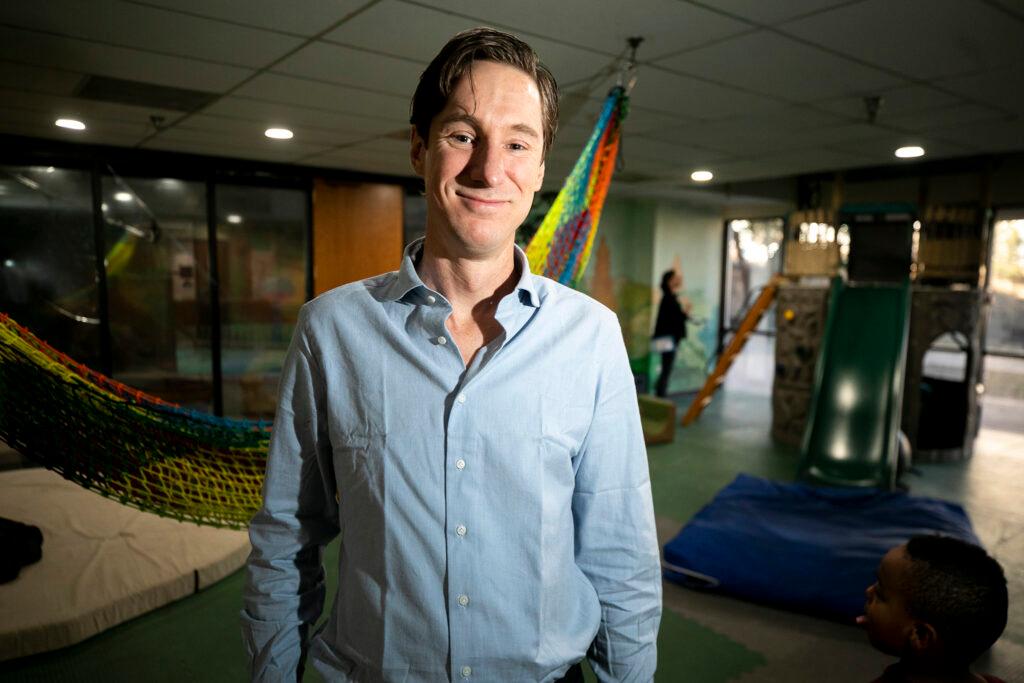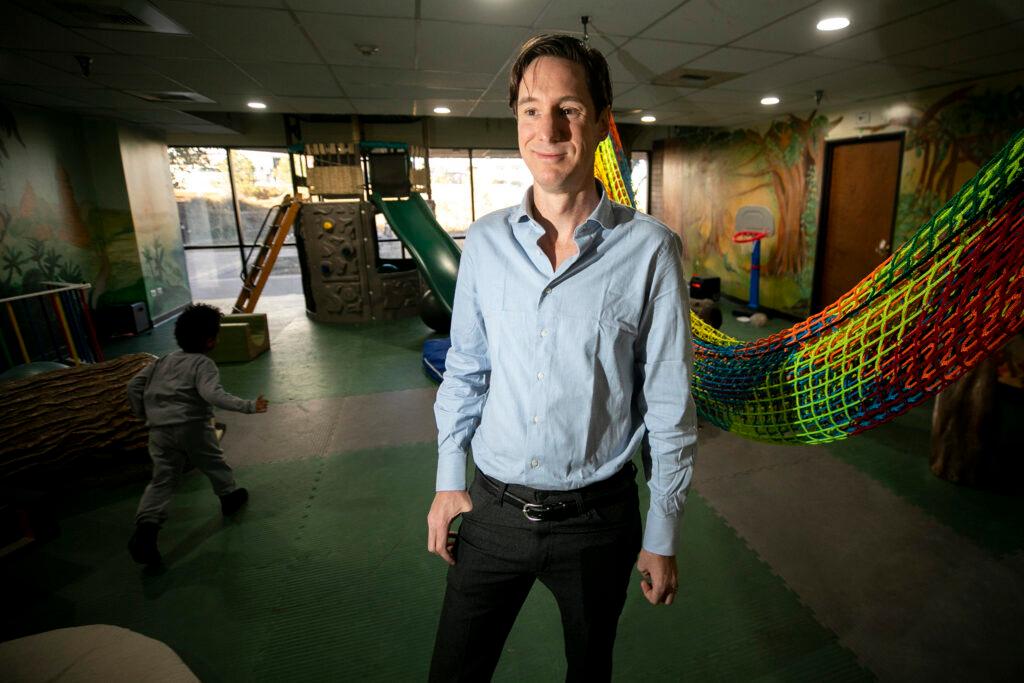
Memories of Carmen Peebles’ old job came flooding back to her as she sat in Denver’s City Park. She often brought the children she worked with there to play and get outside.
As a board certified behavior analyst, Peebles helped autistic children who were falling behind on developmental milestones or had trouble navigating the world around them.
“A lot of it is helping our kids be able to integrate into society and not necessarily changing who they are, but helping them adapt to the environmental changes,” she said. “Parks tend to be a really great place where we go and we practice all those skills that we work on in the home or in a center, and then we want to see them thrive in the community.”
Peebles loved her job at Behavioral Connections of Colorado. But she left in October, after a series of missed paychecks from her employers. She doesn’t really blame her old bosses — she blames a broken system.
“There's only so much you can do when you're dependent on Medicaid and dependent on all these private insurance to pay you a livable rate. And when we don't have that, then we have to choose. What do we do?”
— Carmen Peebles, board certified behavior analyst

Providers say the state’s reimbursement rates are low and restrictive
Through Colorado’s Medicaid program, Health First Colorado, residents may qualify for the state’s free or low-cost health care program depending on how much money they make. Providers that serve Medicaid patients are later reimbursed by the state for procedures and services covered by Medicaid.
Those in the autism care industry have praised Medicaid, which they say helps children from low-income families get much needed care. However, many, including Nicole Da Lima Leitao, have criticized the Colorado Department of Health Care Policy and Financing, or HCPF, which manages the state’s Medicaid program.
Leitao is the clinical director for BehaviorSpan, an applied behavioral analysis therapy clinic that works primarily with autistic children who have significant developmental delays, like being non-verbal or have high intensity behaviors, like self-injury or aggression. She said Colorado’s Medicaid rates are too low and restrictive.
“All we can bill for is when we are in front of a child,” Leitao said.
She said that therapists who work with autistic children spend a lot of time outside one-on-one sessions writing treatment plans, time that isn’t billable through Medicaid. So, oftentimes, therapists have to juggle watching a kid while also writing the treatment plan.
“We've had to get standing [laptop harnesses] so that our [board certified behavioral analysts] can hold their laptops against them while we are working with children with high intensity behaviors because they won't let us bill for writing programs outside of being with a client, which every other insurance company allows us to do."
— Nicole Da Lima Leitao, clinical director for BehaviorSpan
J.J. Tomash, founder of BehaviorSpan, said Medicaid just doesn’t reimburse for some services that are regarded as industry standards.
“We do parent training, programming, a lot of services we just don't get paid for because of the way that the codes are written,” he said. “So yeah, we eat a lot of those costs and just try to balance it out with what we're able to bill.”
There are some services Tomash and Leitao just can’t justify the cost of, like hiring a translator so immigrant families with autistic children can seek out treatment. Those choices have deepened service gaps that were already substantial.
In many cases, therapists do work without knowing whether they’ll be paid for it at all. Peebles had to turn in treatment plans to the state to ask for reimbursement and ran into frustratingly slow responses.
“Sometimes I could provide a month, month and a half, two months of services without payment from Medicaid because I was still waiting on approval for the treatment plan,” she said.

Providers are raising alarms about reimbursement rates as some clinics shut their doors
Tomash said these financial issues have snowballed into an industry-wide crisis that comes as autism rates nationwide get higher and patient bases grow. According to the Centers for Disease Control and Prevention, 1 in 36 children nationwide were identified with autism spectrum disorder in 2020. In 2010, that figure was 1 in 68.
BehaviorSpan currently breaks even financially, but that means they can’t expand staffing to ease workloads or burnout. Employees, not only at BehaviorSpan, but industry-wide, occasionally leave the field to pursue other behavioral health jobs or even for retail or restaurant jobs.
Other clinics haven’t been so lucky.
Brian Lopez, founder of New Mexico-based JumpStart Autism Center, opened a Denver location in 2008. He says when Medicaid eligibility was expanded through the now-expired COVID-19 public health emergency declaration, the state didn’t raise reimbursement rates to make up for the fact that more families were able to access autism care treatment.
“Ultimately, we were never able to overcome the challenges of the public health emergency, and we decided to go ahead and close versus reducing the quality of service that we were offering,” Lopez said.
Lopez and JumpStart aren’t the only providers to pull out of Colorado. Hopebridge, a company with locations in nearly a dozen states, closed 6 of its 8 Colorado locations, earlier this year, with the CEO blaming it on the state’s Medicaid rates.
These closures impact the remaining providers, but in many cases, they’re unable to take on new clientele.
“We've had an influx on a waiting list of kids who were seen by providers who left the state and it's sad because I can only serve maybe one kid out of a hundred applications that our center gets."
— J.J. Tomash, founder of BehaviorSpan
“We've had an influx on a waiting list of kids who were seen by providers who left the state and it's sad because I can only serve maybe one kid out of a hundred applications that our center gets,” Tomash said.
For Leitao, what’s happening to pediatric autism care providers feels like a repeat of what happened to adult autism care centers in Colorado years ago, when she was first starting out in the industry. She used to have adult clients with autism, but companies stopped providing that service when state funding dried up and only paid for periodic sessions.
“Across time, it has become more profitable to work with children than it has with our adult population and not just profitable,” Leitao said. “It's hard to make change or change in adults' life when all you're doing is seeing them for one hour a week. What's that going to do?”

It’s unclear if the state is willing to provide the amount of money providers have requested
In a September hearing before the Joint Budget Committee, Adela Flores-Brennan, the Medicaid director for HCPF, told lawmakers they’ve heard the complaints from providers and will ask the legislature to increase rates during the upcoming session.
“To us, the discussion is a matter of how much we can reasonably increase these provider reimbursement rates in the context of other provider rate increases that may need to happen, in the context of the overall state budget priorities in partnership with you, when those increased reimbursements can take effect and what other policy changes we should consider together,” she said.
A state legislature-appointed group known as the Medicaid Provider Rate Review Advisory Committee, or MPRRAC, advises the state on how Medicaid rates should change. According to its 2023 recommendations for the upcoming legislative budget cycle, Colorado Medicaid pays about 78 percent of the benchmark set by 10 other states for pediatric behavioral health, which includes autism care reimbursements.
MPRRAC recommended Colorado Medicaid raise rates to meet the benchmark, which would cost about $35 million dollars.
However, HCPF disagreed. In the same document, they said the inclusion of Nebraska in MPRRAC’s analysis raised the benchmark too high, arguing it is an extreme outlier. Without Nebraska, Colorado Medicaid pays about 91 percent of the benchmark and they’re only willing to meet that benchmark, which would cost $13 million, just a third of EM-PRACK’s recommendation.
Former MPPRAC member and disability advocate Maureen Welch said that follows a frustrating pattern that she witnessed during her term from 2019 to 2021.
“Our recommendations were very rarely reflected in the recommendation from the director of HCPF Medicaid,” Welch said.
For now, Colorado’s autism care centers look ahead to November 20, when HCPF presents their budget request to the Joint Budget Committee, which providers say will indicate whether their calls for help have been successful.
This is part one of a two part series. The second installment will be published on Friday, Nov. 17.









